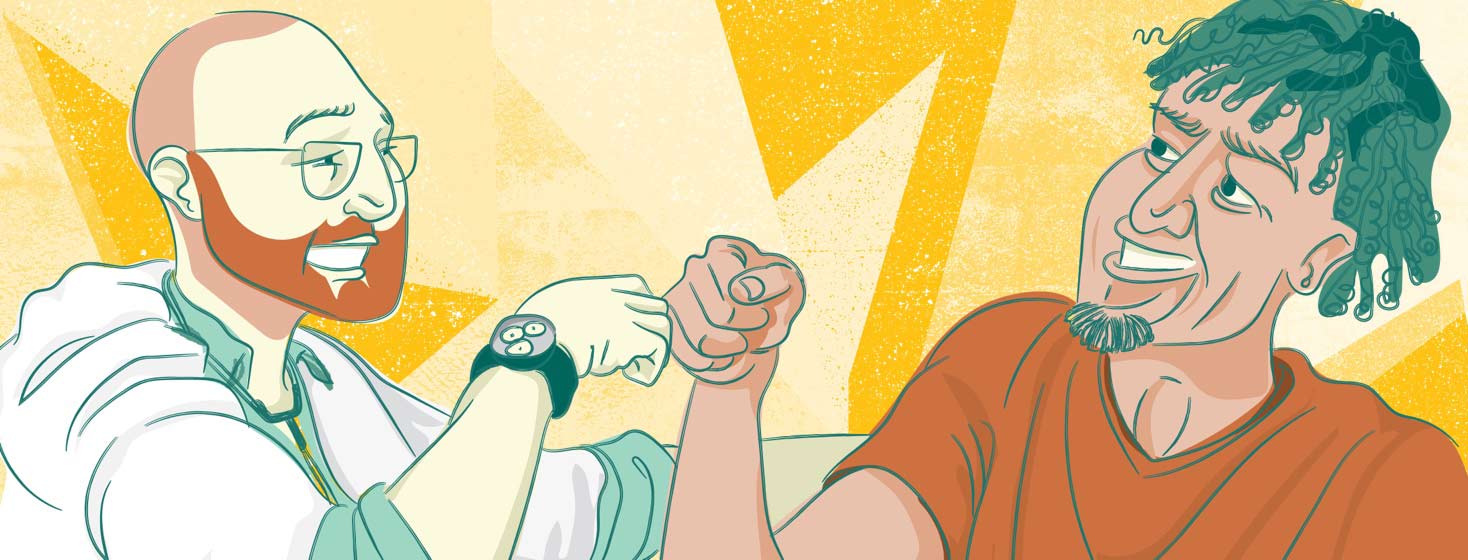A Talk With My Doc: The Importance of Trust
I'm thankful for my HIV doc, Dr. Greg as I call him in writing. In person? It's more like: "Hey! How ya been?" At my most recent appointment I greeted him with: "Hey, are you, like, stalking me?"
It's not the average doctor/patient relationship. But don't mistake the good-natured tone with a lack of seriousness. Since I started seeing Dr. Greg in 1999, we had certain points where we disagreed on a treatment plan. But, every time, we've come to some sort of compromise.
The reason why I accused him of stalking was because, 2 days before, we spoke to first-year medical students. Even though the majority of the doctors-to-be will not be specializing in HIV, it is important for them to hear about the personal impact a medical condition can have.
As well as how doctors and patients can co-exist peacefully. And hilariously.
We may not always agree
When Dr. Greg mentioned that things run pretty smoothly between us, but there are times when we might disagree on something, I joked that we had not come to blows over anything yet. Then I wondered aloud if I could take him in fight.
Dr. Greg's gigantic laugh was the first to fill the room. I wrapped impromptu bit by admitting that I probably couldn't best him, before turning in my seat, looking him up and down then saying, "You're starting to get into that old-man strength territory."
Discussing the stigma that lives on
We discussed the stigma that still persists where HIV is concerned. The discrimination I faced after my diagnosis in 1987 lives on. There are people that don't trust their own inner circles with knowledge of their HIV status. Things are getting better, but there is still a ways to go.
I talked about denial and the long road to acceptance of my status. How, as a teenager with HIV, my mom once had to lie to me just to get me in the car for an appointment. Back then doctor's appointments weren't the prime opportunities to crack a joke at my doctor's expense that they are today.
I loved my childhood doctor, but I hated going to appointments. They were a morbid reminder of the one thing I didn't want to think about. Denial about HIV was, as my favorite band Depeche Mode sang, the only way to "make this life livable."
Start a Forum
The importance of trust between doctor and patient
Dr. Greg entered the picture after my childhood doctor retired. We discussed the early days of our collaboration, which included me starting on HIV medications. I was reticent about treatment because I feared the side-effects of medication more than the fact that my t-cells had crashed dramatically.
The med students are more likely to side with Dr. Greg's position during those first appointments, since they will one day be in his shoes. But, when they hear my backstory about how treating hemophilia is how I contracted not only HIV, but hepatitis B and C, my patient perspective is given some light.
In sharing my personal history, I’m letting them know that patients have their reasons, justified or not, for why they make decisions that might not make sense from the doctor's point of view.
Not all patients are able or willing to give that type of intel to a doctor. They may be where I was for many years, just counting down the seconds until the appointment is over and doing nothing to prolong things. Creating a trust between doctor and patient is important because it opens up a real dialogue.
What makes things work is that Dr. Greg has as much respect for my history with medicine as I do for his. I have my blunders along the way, and he has too. Doctors and patients are, at the end of the day, only human.
A tender moment
The biggest teaching moment, though, was a tender one that happened a few minutes into the talk. When I was rushing through the early days of the discrimination I faced as a child with HIV I got a little choked up. Dr. Greg, who was seated beside me, the only other person at one of those long desks with ten microphones sticking out of the panel, did something simple.
He placed his hand on my shoulder. Just for a few seconds. He was letting me and the students know that I wasn't alone. That he heard the pain in my voice, and he was there to absorb a little of that re-opened trauma.
Compassion.
Unconditional script of compassion
The best doctors know how to prescribe that on the fly. Regardless of the specialized fields that the medical students will pursue, that simple and spontaneous act of kindness is a crucial tool that I hope they will utilize moving forward.
As always, thanks for reading. The more that we understand and accept our own somewhat complicated road as patients, the better we are positioned to truly connect with our physicians, which in turn helps us lead the healthiest lives possible.

Join the conversation